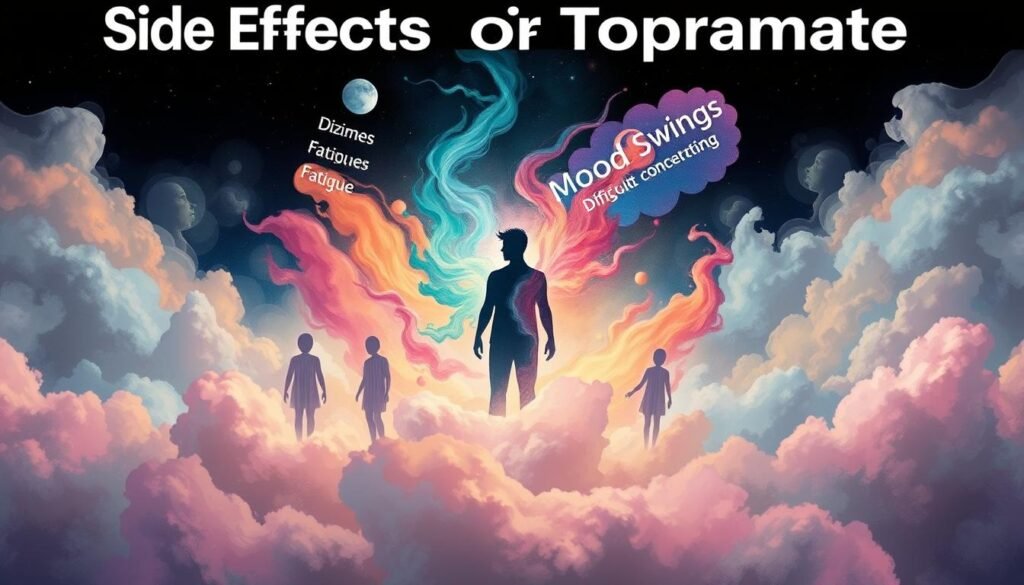Did you know up to 4% of people using Topiramate for epilepsy might lose hair? This fact shows the medication’s complex effects. Originally for seizures and migraines, Topiramate, known as Topamax®, is now looked at for anxiety. Mental health experts and patients are considering its benefits and drawbacks.
This article is a detailed guide on using topiramate for anxiety. It discusses the benefits and possible side effects. Also, it stresses the importance of talking to doctors about the right dose for anxiety treatment. To learn more, visit Healthline.
Key Takeaways
- Topiramate is mainly used for seizures and migraines.
- Research supports its use for anxiety disorders too.
- It can cause mood swings and thoughts of suicide.
- A healthcare professional should adjust the dose as needed.
- Watch for kidney stones and vision problems during use.
- Topiramate may affect birth control pills.
What is Topiramate?
Topiramate is known by brand names like Topamax and Trokendi XR. It’s an anti-seizure drug for anxiety. It was first made to handle seizures and prevent migraines, working through various brain actions. It’s in the sulfamate-substituted monosaccharides group.
It comes as tablets and sprinkle capsules, with many doses available. It can be used by people as young as 2, but with care. It’s also used to deal with weight gain side effects from certain meds.
Using Topiramate needs caution. It can affect how other meds work. Always tell your healthcare provider about all treatments, including those for anxiety or depression. Also, drinking alcohol can mess with how well it works.
While Topiramate helps, it can have tough side effects. Watch for allergic signs, skin blisters, or odd temperature changes. There’s also a risk of lower bone density and thinking issues.
| Benefit | Considerations |
|---|---|
| Prevention of seizures in epilepsy | Risk of severe reactions; require prompt medical attention |
| Effective in migraine management | Interactions with other medications possible |
| May aid in anxiety disorders | Monitor for cognitive side effects |
| Can assist in weight management for certain conditions | May impair bone health and growth |
How Topiramate Works in the Brain
Topiramate helps the brain in several ways to lessen anxiety symptoms. It boosts the effect of GABA, a brain chemical that makes you feel calmer. This helps keep mood stable and cuts down on overactive brain circuits. It’s important for people with anxiety disorders.
GABAergic Effects on Anxiety
Topiramate’s effect on anxiety involves enhancing GABA. GABA is the brain’s main calming chemical. By increasing GABA levels, topiramate strengthens calming signals. This reduces too much activity in areas that control anxiety. It makes people feel better and improves their lives.
Inhibition of Glutamate Release
Topiramate also works by reducing glutamate release. Glutamate is another chemical that, if too active, can make anxiety worse. Topiramate lowers this activity, helping balance brain chemicals. This can make anxiety symptoms less severe for those affected.
Topiramate For Anxiety: Benefits and Treatment Guide
Topiramate is now seen as a possible way to manage anxiety disorders. Its success in reducing symptoms of different anxiety conditions has caught the attention of doctors and researchers.
Potential for Managing Anxiety Disorders
This anticonvulsant medicine is finding use beyond preventing seizures and managing migraines. It’s being used off-label for treating depression, PTSD, and issues with alcohol. This shows topiramate’s versatility as a potential alternative option for those not helped by usual treatments.
Supporting Evidence from Clinical Studies
Clinical studies back up the use of topiramate for hard-to-treat anxiety disorders. Results show it could help lower anxiety in those suffering.
Both controlled and uncontrolled studies support using topiramate as a valid treatment choice. For more info, consider checking out this detailed guide to make a well-informed choice.
Off-Label Use of Topiramate in Anxiety Treatment
Topiramate was first approved to treat epilepsy and prevent migraines. Now, it is also used for anxiety treatment. This off-label use is gaining attention. It has shown effectiveness in treating a variety of psychiatric conditions, including anxiety, mood disorders, and even psychosis.
Recently, research and case studies have shown topiramate helps with generalized anxiety disorder and panic disorder. This is especially true for people who don’t see results from first-line treatments. An interesting use of topiramate is in treating eating disorders like binge eating disorder and bulimia nervosa.
However, topiramate might also cause panic attacks in some, such as those with bipolar affective disorder. A case study detailed a woman with chronic bulimia nervosa who faced panic attacks after starting topiramate. Her symptoms began at a 50 mg/day dose and stopped when the medication was halted. The panic attacks returned with an increased dosage.
This points to a clear link between topiramate use and panic attacks in certain cases. It’s crucial that we understand why this happens. Doing so will help us care for patients and reduce their risk.
| Aspect | Details |
|---|---|
| Approved Uses | Epilepsy, Migraine Prevention |
| Off-Label Uses | Bipolar Disorder, Binge Eating Disorder, Alcohol Use Disorder, Anxiety Disorders |
| Panic Attack Link | Reported in specific cases, especially with dosage adjustments |
| Research Status | Further studies needed on panic attack mechanisms and efficacy in anxiety treatment |

Topiramate Dosage for Anxiety Management
It’s key to know the right topiramate dose for anxiety control. Starting doses guide therapy start while reducing side effects. For anxiety, the initial dose is usually between 25 mg and 50 mg daily. The goal is to gradually find the best dose for each person.
Initial Dosing Recommendations
Starting with a low dose helps check if the medication works well and is tolerable. The dose is slowly increased to make any needed changes safely. Regular check-ups help adjust the dose to meet the patient’s changing needs. For example, starting doses are often revisited and adjusted for the best results.
Adjusting the Dose Over Time
As time goes on, the topiramate dose for anxiety might need tweaks based on progress and side effects. Keeping a close watch helps adjust the dose carefully. It’s vital to keep talking to healthcare providers during this time. Following initial dosing guidelines and updating plans as necessary is crucial for safety and effectiveness.
| Dosing Method | Initial Dose | Typical Range | Administration Method |
|---|---|---|---|
| Topiramate Tablets | 25 mg to 50 mg | 100 mg per day | Swallow whole with water |
| Topiramate Sprinkle Capsules | 15 mg or 25 mg | Up to 100 mg per day | Sprinkle on soft food for easier consumption |
Topiramate Side Effects
Topiramate helps manage anxiety but comes with side effects. It is vital to know the mild and serious effects to use it safely. This helps patients act quickly if they notice worrying signs.
Mild Side Effects
Topiramate has common, mild side effects. These can impact daily activities but are usually not dangerous. They include:
- Nausea
- Dizziness
- Fatigue and sleepiness
- Loss of appetite or weight loss
- Headaches and stomach pain
- Constipation or diarrhea
- Pins and needles sensation or numbness
If you have these symptoms, talk to your doctor.
Serious Side Effects
Some side effects are serious and need quick medical help. These issues can greatly affect your health. Symptoms to watch for:
- Blurred vision, difficulty seeing, and eye pain (potential signs of glaucoma)
- Severe abdominal pain, burning sensation during urination (indicative of kidney stones or infections)
- Irregular heartbeat and extreme fatigue (possible signs of metabolic acidosis)
- Significantly reduced sweating in children, leading to dangerously high body temperature
- Signs of a serious allergic reaction such as swelling in the throat, difficulty breathing, and skin reactions
If you notice serious side effects, don’t drive yourself. Call for help right away. Remember, this list is not all-inclusive. Always check the medication leaflet for more details on possible side effects.

| Side Effect Type | Examples | Action Required |
|---|---|---|
| Mild Side Effects | Nausea, Dizziness, Fatigue | Consult healthcare provider if persistent. |
| Serious Side Effects | Blurred Vision, Severe Abdominal Pain, Allergic Reactions | Seek immediate medical attention. |
Alternative Anxiety Treatments
Managing anxiety is not just about medication. Alternative anxiety treatments can also work well. In the United States, 32% of people are dealing with anxiety issues. Around the world, the number reaches 264 million.
Doctors often prescribe SSRIs and SNRIs for anxiety. They are a top choice for treating conditions like GAD and SAD. Though many patients benefit from these drugs, full recovery is hard for some.
It’s key to mix drug treatments with other methods. You can try:
- Cognitive Behavioral Therapy (CBT)
- Mindfulness and meditation
- Exercise and physical activity
- Support groups
- Herbal remedies, like chamomile and passionflower
It’s worth thinking about using topiramate. This drug might work well with others. Or, it could be enough on its own. Mixing anxiety medication with other treatments can create a better plan for beating anxiety.
| Treatment Approach | Moderate to Severe Anxiety | Common Used Drugs |
|---|---|---|
| SSRIs | First-line treatment | Fluoxetine, Sertraline |
| SNRIs | Effective for GAD and SAD | Duloxetine, Venlafaxine |
| CBT | Non-pharmacological | N/A |
| Herbal Remedies | As adjunct therapy | Chamomile, Valerian Root |
Knowing your options for alternative anxiety treatments lets you make better decisions. A care plan designed for you is the best way to handle anxiety.
Understanding Topiramate Reviews
Topiramate reviews shed light on its use for anxiety. People share their experiences, revealing how it works for them. These stories help others decide if it’s a good choice for managing their symptoms.

Patients often have mixed feelings about topiramate. Some find it effective, while others face difficulties early on. Their stories set expectations for newcomers.
- Adjusting to the medication requires patience.
- Some users report trouble focusing, mood swings, and digestive issues.
- Others praise its benefits on weight and hunger control.
Reviews also touch on topiramate’s off-label use, expanding its anxiety treatment role. For those interested in anxiety signs and treatment, more information is available here. These experiences provide a full picture of topiramate’s pros and cons.
| Experience Type | Percentage of Patients Reporting |
|---|---|
| Improvement in Anxiety Symptoms | 44%* |
| Reduced Appetite | Varies, commonly reported |
| Mood Changes | Noted by several patients |
| Side Effects Leading to Discontinuation | Numbers vary widely |
Looking at topiramate reviews gives vital views on its effectiveness in anxiety care. These insights reflect both successes and setbacks users face.
Combining Topiramate with Other Anxiety Medications
Using topiramate with anxiety medicines can provide better symptom management. It offers more relief for those with anxiety disorders. When customized for individuals, the mix of topiramate and other drugs shows promise.
Considering potential drug interactions before starting is key. Topiramate may change how other medications work, or increase side effects. It’s important to watch how it interacts with CNS depressants, lithium, and certain antiepileptic drugs.
Some drug combinations can cause more sedation, confusion, or dizziness. Mixing topiramate with benzodiazepines or alcohol might make sedation too strong. Everyone should tell their doctors about all drugs and supplements they use.
To better understand the potential interactions, here’s a table with common drugs that could interact with topiramate and their effects:
| Drug Category | Interaction Type | Potential Effect |
|---|---|---|
| CNS Depressants | Increased Sedation | Greater risk of sleepiness and confusion |
| Antiepileptic Drugs | Altered Efficacy | Potential decrease in topiramate levels |
| Lithium | Increased Blood Levels | Greater risk of side effects |
| Alcohol | Increased Side Effects | Heightened risk of confusion and drowsiness |
| Hormonal Contraceptives | Reduced Efficacy | Decreased contraceptive effectiveness |
Deciding to use topiramate with other anxiety medicines needs careful thought. Every person responds differently, which makes monitoring by healthcare providers critical. They may need to adjust treatment to find the best approach.
Conclusion
Research on topiramate for anxiety shows promising results. It seems to lower stress and help with anxiety and aggressive behavior. This makes it a good option for treating different anxiety disorders.
The drug also benefits a wide range of people, like women with borderline personality disorder. It can lead to weight loss and improve several aspects of life. So, it might be helpful for those looking to ease anxiety issues.
Talking to doctors about topiramate is key. Treatments should fit the person’s unique needs for the best results in controlling anxiety. For more information, check out the detailed study here. It shows the importance of personalized treatment plans for anxiety disorders.